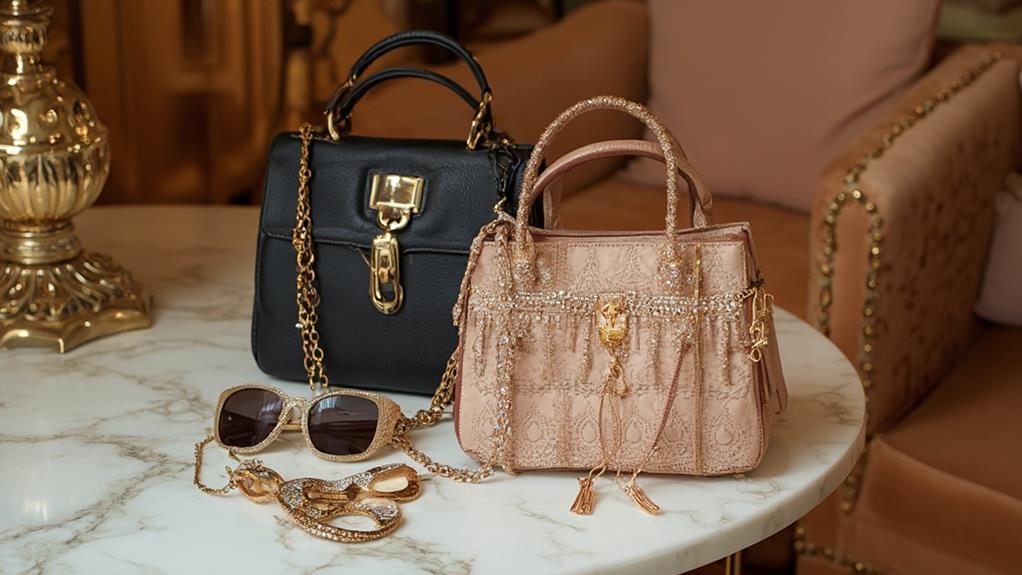When it comes to maneuvering the more refined aspects of language, spelling "boujee" correctly can be a bit tricky. You might have seen different spellings floating around, and it's easy to get confused. The term carries a certain cultural weight, especially in distinguishing it from "bougie." Understanding the nuances of its pronunciation and meaning is essential to using it accurately. But how do you guarantee you're spelling it right and not falling into common traps? Let's break it down and clear up any misconceptions.
Definitions and Key Differences
Understanding the definitions and key differences between "bougie" and "boujee" helps clarify their distinct social implications.
"Bougie," pronounced BOO-zhee, denotes individuals who pretend to be wealthy, often carrying a negative connotation due to its association with pretentiousness and materialism. When you hear someone described as bougie, it typically means they're perceived as insecure about their social class and attempting to project an image of wealth they don't truly possess.
On the other hand, "boujee," pronounced BOO-jee, signifies individuals who are genuinely wealthy and self-made. Unlike bougie, boujee is celebrated for its authenticity and connection to one's roots. Boujee individuals display confidence and pride in their financial achievements and upward mobility. This term embraces success without the negative undertones of pretense.
Both terms originate from the French word "bourgeoisie," yet they diverge considerably in meaning and social class implications. While bougie critiques materialism and a false display of wealth, boujee exalts genuine success and self-made prosperity.
Their similar pronunciation and spelling often cause confusion, but understanding these distinctions can help you navigate social conversations more meaningfully.
Etymology and Origins
The etymology and origins of "boujee" and "bougie" offer a fascinating look into how language evolves. Both terms trace back to the French word "bourgeoisie," referring to the middle class that emerged during the 16th century.
Historically, "bourgeoisie" was linked to material wealth and social pretentiousness, which later gave "bougie" a negative connotation. This term critiqued consumerism and the lifestyles of those perceived as socially climbing, gaining traction as slang in the 1960s and 1970s.
Fast forward to 2016, the hip-hop group Migos introduced "boujee" in their hit song "Bad and Boujee." This modern twist celebrated self-made success, shifting the term's meaning to embrace rather than critique materialism and social class.
The word "boujee" hence redefined itself within contemporary culture, especially within hip-hop, to signify a positive representation of consumerism and upward mobility.
Understanding the etymology of "bougie" and "boujee" provides insight into evolving societal attitudes toward wealth and class. These terms reflect a journey from negative perceptions of pretentiousness to a more celebratory acknowledgment of self-made success, resonating deeply with those who value both identity and aspiration.
Popularity and Media Usage
You'll notice that "boujee" skyrocketed in popularity after Migos' 2016 hit "Bad and Boujee," which celebrated luxury and success.
Social media influencers often use the term to highlight genuine affluence, embracing it positively compared to the more negative "bougie."
This generational shift reflects broader societal changes in attitudes towards wealth and personal identity, making "boujee" a staple in modern slang.
Rise in Hip-Hop
Following its release in 2016, Migos' hit song "Bad and Boujee" catapulted the term boujee into hip-hop culture and mainstream media. The song celebrated a self-made, luxurious lifestyle, resonating with many who aspired to this affluent image. Migos effectively brought boujee into the spotlight, transforming it into a symbol of wealth and style within hip-hop culture.
The term boujee, derived from the word bourgeois, has evolved to represent authenticity and upward mobility, contrasting sharply with bougie, which often implies pretentiousness. As you listen to "Bad and Boujee," you're not just hearing a catchy tune; you're engaging with a cultural shift. This shift emphasizes the celebration of wealth and success, especially when achieved from humble beginnings, aligning perfectly with the hip-hop ethos.
Boujee has since permeated the vernacular of younger generations, becoming a key descriptor of luxury and self-made success. Various artists and influencers have embraced the term, further embedding it in popular culture.
As you navigate this evolving landscape, understanding the rise of boujee in hip-hop offers insight into contemporary perceptions of wealth and authenticity, and how these values are celebrated in the music and beyond.
Social Media Trends
As boujee became synonymous with the celebration of wealth and success in hip-hop, it quickly found a thriving platform on social media. The term exploded in popularity in 2016 after Migos released "Bad and Boujee," and since then, social media platforms like Instagram and TikTok have showcased this lifestyle prominently.
Influencers began flaunting luxury fashion, extravagant vacations, and high-end products, creating a visual narrative of aspirational living that appeals to many. Hashtags such as #Boujee and #BoujeeLife regularly trend, reflecting a cultural fascination with luxury.
These hashtags help content gain visibility, further promoting the boujee lifestyle. Memes also play a significant role, often humorously contrasting genuine wealth with pretentiousness, making boujee both a target of admiration and satire.
Fashion brands and luxury experiences are integral to boujee culture, with influencers driving trends by constantly sharing their high-end lifestyles. This has a considerable impact on consumer behavior, as followers aspire to emulate these glamorous lives.
Social media has therefore become a powerful platform for promoting and sustaining the boujee phenomenon, making it a central theme in today's digital culture.
Generational Acceptance**
The term "boujee" has carved out a distinct place in modern culture, particularly among younger generations who embrace it as a marker of success and luxury. You'll notice its roots in hip-hop culture were solidified in 2016 with Migos' hit song "Bad and Boujee." This track celebrated the idea of self-made success and luxury, shaping the term's contemporary connotations.
Generational acceptance of "boujee" is profound, especially as younger people encounter it frequently in social media and influencer culture. Platforms like Instagram and TikTok showcase boujee lifestyles, often depicting them aspirationally.
Unlike the older term "bougie," which carried critical connotations of pretentiousness, "boujee" now symbolizes genuine upward mobility and success.
In hip-hop culture, many artists proudly use "boujee" to denote wealth and achievement. This shift mirrors changing societal attitudes towards wealth and class, highlighting a more positive recognition of success.
Influencers, too, play a significant role by normalizing and popularizing boujee lifestyles, making the term more mainstream.
Ultimately, "boujee" reflects evolving societal values, where upward mobility and luxury aren't just celebrated but desired, marking a significant shift in how wealth and success are perceived.
Examples and Contexts
When incorporating "boujee" into your vocabulary, it's vital to understand its usage in various contexts. "Boujee" and "bougie" are terms that have distinct meanings within hip-hop and cultural slang. "Boujee" typically denotes genuine affluence and luxury, while "bougie" often implies pretentiousness. This subtle distinction is significant, as the spelling and pronunciation can affect how you're perceived in conversation.
The pronunciation of "boujee" (/ˈbuːʒi/) features a hard "g" sound, setting it apart from "bougie" (/ˈbuːʒi/) with a soft "j" sound. This nuance can make a considerable difference in understanding.
"Boujee" surged in popularity following Migos' 2016 hit "Bad and Boujee," embedding the term into popular culture and solidifying its role in discussions of materialism and social status.
In context, you might use "boujee" to describe an experience or item that exudes luxury without pretense. For example, saying, "We're having a boujee dinner tonight," suggests an upscale, authentic experience.
Societal Implications
Understanding the societal implications of "boujee" reveals its deeper significance beyond mere slang. When you explore the term "boujee," you see it as a celebration of upward mobility, particularly within the African American community. Boujee highlights genuine financial achievements and a strong cultural identity.
Unlike "bougie," which critiques superficial displays of wealth and pretentiousness, boujee represents authenticity and confidence.
The rise of boujee in popular culture, especially through hip-hop, emphasizes empowerment. It reshapes societal perceptions of wealth and success by promoting a narrative of achievement that remains connected to one's roots. Boujee individuals are typically viewed positively; they embrace their financial achievements while fostering a sense of community and identity.
This distinction between boujee and bougie underscores societal attitudes towards class. Boujee signifies authentic success and pride in one's heritage, while bougie often reflects insecurity and a need to appear affluent.
Spelling Tips and Variations
When spelling "boujee," you'll encounter variations like "bougie," "boujie," and "boojie," which mirror its phonetic pronunciation.
Remember, "bougie" comes from the French "bourgeois" and tends to imply pretentiousness, while "boujee" is tied to hip-hop culture and signifies genuine success.
To avoid confusion, use the mnemonic "o-u-i-e" for "bougie" and note that "boogie" is unrelated and has different connotations.
Common Spelling Variations
Maneuvering the various spellings of "bougie" can be a bit tricky, but understanding the common variations can help you choose the right one for your context. The term "bougie" often appears with alternative spellings such as "boujee," "boujie," and "boojie." These variations reflect phonetic pronunciations and cultural adaptations.
While "bougie" originates from the French word "bourgeois," referring to the middle class, "boujee" is a phonetic variant that has gained traction in contemporary slang.
Each variation is pronounced similarly, yet there are subtle differences: "bougie" has a soft /j/ sound, whereas "boujee" features a harder /g/ sound. The spelling "bougie" remains the most recognized and widely used version, making it the safest choice if you're aiming for clarity and widespread understanding.
To help you remember, think of the vowel sequence in "bougie" (o-u-i-e) as a mnemonic device. Despite the popularity of alternative spellings, "bougie" is typically the most appropriate term in both written and spoken contexts.
Phonetic Spelling Tips
Maneuvering the phonetic spelling of "boujee" involves recognizing its distinct pronunciation and cultural connotations. Phonetically, "boujee" is pronounced as /ˈbuːd⧂i/, featuring a hard /g/ sound, setting it apart from the softer pronunciation of "bougie" (/ˈbuː⧂i/). This distinction is significant in contemporary slang, particularly within hip-hop culture and African American Vernacular English (AAVE).
To accurately spell "boujee," remember it embodies a positive, stylish connotation linked to genuine wealth and success. Unlike its variant "bougie," which can sometimes imply pretentiousness, "boujee" celebrates authenticity. Associating the vowel sequence (o-u-j-e) with a luxurious and "fancy" lifestyle can serve as an effective memory aid.
Variations like "bougie," "boujie," and "boojie" exist, but "boujee" has gained prominence, especially after the Migos' hit song "Bad and Boujee." This underscores its relevance in modern slang and cultural contexts.
Frequently Asked Questions
Is It Spelled Bougie or Boujee?
You spell it "boujee" when referring to boujee culture, lifestyle, fashion, music, food, slang, parties, brands, travel, and trends. "Bougie" often carries a negative connotation. Embrace the right term to belong!
What Does Boujie Mean?
Boujie means embracing a luxurious lifestyle and culture, celebrating success and authenticity. You'll see it in fashion, food, music, language, parties, brands, travel, and trends. It's all about upward mobility and genuine connection to roots.
What Does so Boujee Mean?
Imagine living in a castle of luxury. "So boujee" means embracing a boujee lifestyle—boujee fashion, boujee food, boujee travel, boujee music, boujee parties, boujee brands, boujee art, and boujee trends. It's a celebration of opulence.
Does Boujee Mean Fancy?
Yes, "boujee" means fancy. It signifies a luxury lifestyle with high-end fashion, gourmet dining, upscale events, elite socializing, refined taste, extravagant living, posh experiences, stylish decor, and chic accessories, reflecting success and sophistication.







